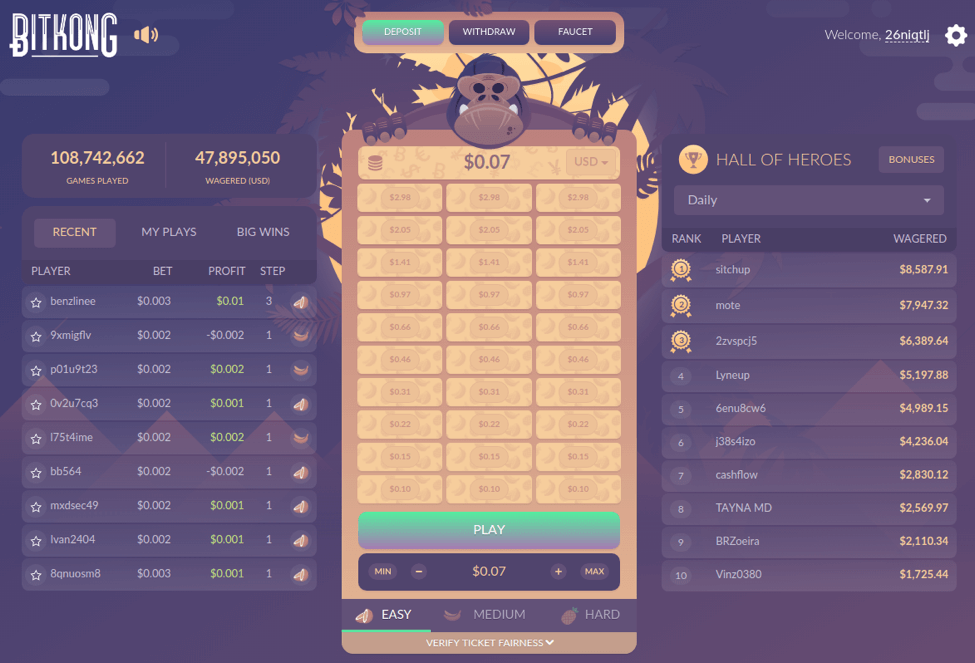
While the main sales pitch of Bitcoin has always been that it allows users to route around governments and banks to create a new, decentralized financial system, one online gambling site, known as BitKong, is now offering a feature of traditional banking to their users: savings accounts.
Giving people the ability to invest in a bitcoin-denominated gambling website is not a new idea, but the difference with BitKong is they allow their users to receive a fixed return on their investment rather than taking the profits and losses with the house.
Currently, BitKong offers an 8 percent return for those who wish to set up a savings account.
What is BitKong?
BitKong launched in late 2015 as an attempt to offer something different from the many different dice-focused games available in the bitcoin gambling industry at the time. The website is a provably-fair game of chance where players try to pick the correct button on the screen in a manner similar to picking a ball from under a selection of cups.

BitKong has attempted to reach a global audience, and their game is available in 12 different languages with 22 different currencies available in the user interface (although it’s all bitcoin on the backend).
As a side note, the bitcoin gambling industry is not as small as some may think. For example, a ticker on BitKong’s website indicates nearly 25,000 bitcoin (nearly $50 million at current prices) worth of bets have been placed on the site since it launched. When reached for comment, a BitKong representative told me that their largest payout to date was 80 bitcoin, which was worth $185,700 at the time of this writing.
The same representative also told me that BitKong has plans to expand their operations via a new social gambling platform.
“It’s already almost a year we’ve been working on creating a platform for social gambling, which will help us launch new games quickly,” said the representative. “[A] new version of BitKong and new dice game will be based on this platform coming soon. We have a lot of unique game ideas to be brought to life. We are convinced, that [the] online gambling industry falls behind technological progress and we plan to revolutionize this industry with brand new ideas and breakthrough technologies.”
How the Savings Account Works
So onto the bitcoin savings account.
There aren’t many options for getting a return on an investment made in bitcoin outside of the gains that can be made via the digital asset’s price appreciation or further speculation in the altcoin market.
The BitKong savings account works like a traditional savings account that you would find at a normal bank. Although the offered interest rate fluctuates, an annual interest rate of 8 percent is currently available to depositors. Withdrawals can be made at any time after a deposit has been processed, which happens once per day.
According to the BitKong representative, the bitcoin savings account was implemented to allow the website to take bets from whales (big money players). Instead of adding depositor funds directly to the house’s bankroll, BitKong opted for a fixed rate of return for depositors.
“Some games solve [the issuing of increasing the house’s bankroll] by attracting investments into bankroll, which requires serious trust to the operator,” said the BitKong representative. “The drawback of this is that in cases of losses in bankroll, investors share [those] losses. Our idea is that investors (depositors of savings account) can earn a lot or a little, but never lose because [the] maximum bet of the game and interest rate of savings accounts are adjusted automatically by[a] risk management algorithm to avoid long term losses.”
Bitcoin’s Long History of Exit Scams
It should be pointed out that the Bitcoin ecosystem has a long history of people sending their bitcoins to someone else in the hope of receiving a greater return on their base speculation on the bitcoin price. The most notorious example from the past is known as Bitcoin Savings and Trust, while GainBitcoin is a present-day alleged Ponzi scheme operating in India.
The problem with handing over a digital asset like bitcoin to someone else is that the counterparty has an incentive to run away with the funds, especially if they’re at least somewhat anonymous and they’re holding hundreds of thousands or millions of dollars for an increasingly large userbase.
“Well, one can not guarantee that about any game operator for 100% nowadays,” said the BitKong representative when asked why depositors should trust the owners of the gambling platform. “We decided that our high quality game and reputation during a long time is the best way to prove people we are secure. We have 100% payment rate, no matter how big were the winnings.”
Those who are thinking about depositing some bitcoin into a BitKong savings account will need to ask themselves if an 8 percent annual return makes up for the possibility that the anonymous owners of the gambling platform could run away with the funds tomorrow.
“It’s not that owners strive to be absolutely anonymous, no,” said the representative from BitKong when asked about the anonymity of its owners. “But they just don’t think it’s time to become public.”
According to the BitKong representative, the bitcoin savings account was implemented to allow the website to take bets from whales (big money players). Instead of adding depositor funds directly to the house’s bankroll, BitKong opted for a fixed rate of return for depositors.
“Some games solve [the issuing of increasing the house’s bankroll] by attracting investments into bankroll, which requires serious trust to the operator,” said the BitKong representative. “The drawback of this is that in cases of losses in bankroll, investors share [those] losses. Our idea is that investors (depositors of savings account) can earn a lot or a little, but never lose because [the] maximum bet of the game and interest rate of savings accounts are adjusted automatically by[a] risk management algorithm to avoid long term losses.”

